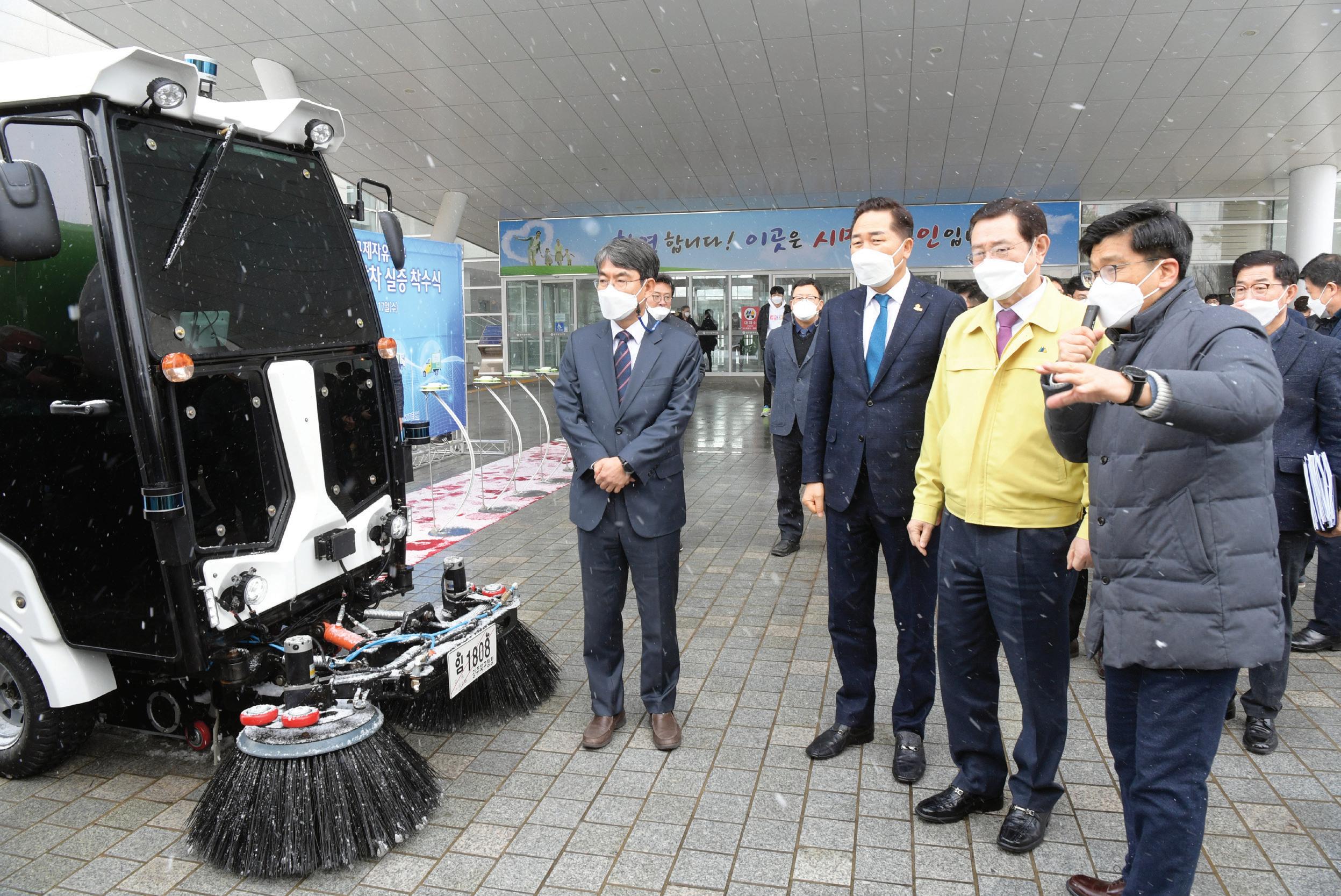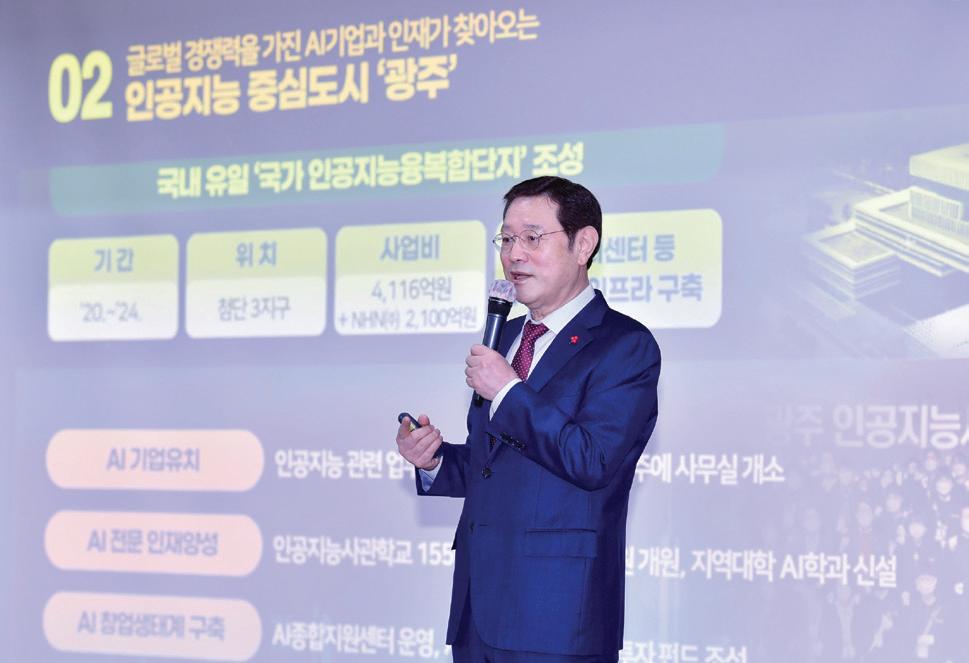
4 minute read
Gwangju City News
From the Gwangju Metropolitan City Hall website.
Gwangju City First in Nation to Test Self-Driving Public Vehicles
Advertisement
Gwangju will have the nation’s first autonomous, lowspeed special vehicles in the public service sector. On February 17, Gwangju City and the Ministry of SMEs and Startups held a demonstration launching ceremony for the Autonomous Low-Speed Special Vehicle Regulatory Free Zone Project in front of City Hall.
This presentation consisted of a demonstration of lowspeed special vehicle public autonomous driving, and the collecting and sharing of public information data. Until now, a prerequisite for autonomous driving in Korea has been with a driver on board, but the Gwangju Free Regulatory Zone Project is characterized by autonomous driving without a human in the vehicle – the first in the country for this. In December 2019, Gwangju was designated as a free regulatory zone in seven areas, including the Pyeongdong Industrial Complex, the Hanam-Jingok Industrial Complex, the Suwan district, Uchi Park, the Bitgreen Industrial Complex, and Songjeong Park, and signed an MOU with special zone operators in July last year. In the Gwangju Regulatory Free Zone, special regulations on temporary road permits, road driving permits, and access to urban parks are allowed for autonomous, lowspeed special vehicles to the extent that safety is ensured.
Accordingly, Gwangju City received a temporary driving permit from the Ministry of Land, Infrastructure, and Transport on January 29, satisfying the performance test that applies to the above special cases to obtain temporary
The vehicles will operate in the Pyeongdong Station area in the Pyeongdong Industrial Complex, in Seongdeok Park in the Suwan district, in Goraesil Park, and in Uchi Park. The autonomous vehicles will be monitored in real time through a control center, respond through remote control in case of abnormal situations, and collect and share public information data with institutions and companies that need it.
These vehicles will operate at a low speed of 5–7 km./ hr. for safety, between 10 a.m. and 12 p.m. and between 2 and 4 p.m., when traffic is low, avoiding operation during commuting times and lunch breaks. However, at Uchi Park, the opening hours will avoid 7 to 9 a.m. and 6 to 8 p.m.
These vehicles are expected to improve the hazardous working environment for street cleaners, such as traffic accidents at dawn, and improve work efficiency through taking over simple repetitive work. In addition, it is predicted that an industrial ecosystem will be created for future businesses in the field of autonomous driving, such as key components of radar and the development of autonomous driving system technology and commercialization promotion in Gwangju.
At the launching ceremony, Yoon Hong-sik, CEO of AM Special Vehicles, said, “We will actively promote the autonomous vehicle business to not only local governments but also foreign buyers such as Spain and promote innovative growth in the local industry.”
Mayor Lee Yong Sup said, “Gwangju has made efforts to find future business models and preemptively respond to changes in the industrial landscape in preparation for the fourth industrial revolution.”
Gwangju Metropolitan City Mayor Lee Yong Sup shared with local businessmen the current situation and future directions of the city’s core policies, and requested cooperation and interest for the “great Gwangju era.” Mayor Lee gave a special lecture on the theme of “Directions of Gwangju Municipal Administration Management in 2021” at the Gwangju Employers’ Federation’s Friday Breakfast Forum held at the Gwangju Science and Technology Promotion Agency. Mayor Lee first said, “We have been working hard to protect the community with the combined capabilities of Gwangju citizens in the wake of the unprecedented COVID-19 situation over the past year,” expressing gratitude to citizens who actively participated in the quarantine, despite massive damage and inconvenience. He then shared some of the policies achieved through innovation and communication, such as the construction of a Gwangju-tailored job automobile factory, the creation of an “artificial intelligence-centered city, Gwangju,” the construction of the second subway line in 17 years, and the designation of the free economic zone. He also cited the creation of the largest start-up complex in the Honam region, which will have investments of 1.2 trillion won by 2025 and attract 124 state-run projects that will change Gwangju’s future.
Mayor Lee then expressed the strong will of the three major Gwangju-tailored new deals, including the artificial intelligence-oriented Digital New Deal, the carbon neutral AI Green New Deal, and the mutually beneficial Human New Deal. Moreover, he said “We will start construction of a world-class national AI data center to open artificial intelligence at Gwangju University, attract artificial intelligence leading companies at home and abroad, and open artificial intelligence start-up camps.”
He also announced that new jobs will be created for local youth through full-scale promotion of the Gwangjutailored AI Green New Deal, which aims to make Gwangju a “2045 carbon-neutral and energy-independent city,” and through a Gwangju-tailored jobs-producing car factory that will produce finished cars in earnest from September.
Mayor Lee Yong Sup reiterated his pledge, “We will lead the way at the forefront of change and make, in 2021, a Gwangju that no one can follow,” and added, “We thank local entrepreneurs who maintain employment and the local economy despite the severe situation presented by COVID-19 and ask for their active participation and cooperation.
To Make Gwangju a Memorable City in 2021
Translated by Melline Galani.











